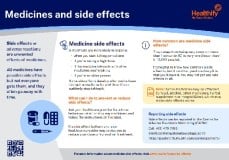You can now add Healthify as a preferred source on Google. Click here to see us when you search Google.
Side effects of immune checkpoint inhibitors
Key points about side effects of immune checkpoint inhibitors (ICIs)
- Immune checkpoint inhibitors (ICIs) affect the immune system and can cause side effects related to inflammation in many parts of your body.
- Side effects can happen at any time during your treatment or even months after treatment has finished.
- It's important to report any side effects to your healthcare team right away even if they appear mild. Don't manage these side effects on your own.

Immune checkpoint inhibitors (ICIs) are medicines that help the body's immune system treat some types of cancer. They are a type of immunotherapy. Examples of immune checkpoint inhibitors available in Aotearoa New Zealand are:
- atezolizumab (also called Tecentriq)
- durvalumab (also called Imfinzi)
- ipilimumab (also called Yervoy)
- nivolumab (also called Opdivo)
- pembrolizumab (also called Keytruda).
Like all treatments, ICIs can cause side effects. They may cause immune-related side effects because they stimulate the immune system. This can make the immune system overactive and affect both normal cells and cancer cells, leading to inflammation (swelling) in any part of your body. Side effects are a sign the treatment is affecting your immune system, but doesn't necessarily mean the treatment is affecting the cancer.
- The chances of getting these side effects can vary between different ICI's. Before starting treatment your healthcare team will talk to you about possible side effects.
- Most people have mild side effects. Side effects are likely to be more severe if you're having higher doses or a combination of ICI medicines, or if you're having them with other cancer treatments.
- Side effects can happen at any time during your treatment or even months after it's finished. Some side effects go away within a few days or weeks and some may be longer lasting.
- It's important to report any side effects to your healthcare team right away even if they appear mild. Don't manage these side effects on your own.
If you experience any symptoms, feel unwell or notice any changes, contact your healthcare team.
Video: Introduction to ICI immunotherapy side effects
Credits: Princess Margaret Cancer Centre
Why do I need to report side effects straight away?
Side effects can be better managed if reported early. It’s important to let your healthcare treatment team know about new or worsening symptoms, even if they seem minor or you’re not sure if they're related to your treatment. If left untreated, side effects can become serious and may even be life-threatening. Sometimes it can be tricky to know whether your symptoms are related to the cancer or the treatment. When in doubt, reach out to your healthcare team.
Some side effects can happen after you stop treatment
If you become unwell, even years later, it is important to tell any healthcare providers you see that you've had immunotherapy. Some healthcare providers may not be familiar with the side effects of these medicines. Your cancer team may give you a card with information about your treatment and potential side effects. You can show this card to other healthcare providers you see and ask them to consult with your cancer team.
Before starting ICIs you'll have some tests to check that you're well enough to have these medicines before treatment begins. Throughout treatment, you'll have monitoring and blood tests to check your thyroid, liver, kidneys and blood.
Early detection of issues through tests and monitoring allows your healthcare team to intervene before they become more severe, potentially preventing long-term damage to organs or other irreversible side effects. Sometimes signs of side effects are picked up on your blood tests even if you feel completely well. In some cases, you'll need to repeat your blood test after a few days. Tests may help to guide adjustments to your dose.
Tests and monitoring can also help to assess how well the ICI is working by measuring certain markers, like tumour markers, which may indicate whether the cancer is shrinking or progressing.
Higher doses or combination therapy
Higher doses of ICIs are more likely to cause side effects and make them worse. Also using many ICIs or combining them with other cancer treatments such as chemotherapy or radiation can increase the risk and severity of side effects.
Autoimmune diseases
Autoimmune diseases make the body’s immune system overactive so it attacks normal cells, causing redness, swelling and pain (inflammation). People who have autoimmune diseases such as ulcerative colitis, rheumatoid arthritis, lupus or psoriasis may be at higher risk for flare-ups or worsening of their condition. You may still be able to have immunotherapy, but there will be extra issues to consider.
Taking other medicines, vitamins, supplements or herbal therapies
Before taking any medicines or supplements talk to your healthcare team. Some may affect how the ICIs work or make side effects worse. These include:
- over-the-counter medicines
- probiotics
- vitamins
- supplements
- herbal therapies
- rongoā Māori.
Live vaccines
Always check with your healthcare team before you have any vaccinations. Do not have live vaccines such as MMR, rotavirus or yellow fever vaccine while you are being treated with ICIs and for several months afterwards.
Non-live vaccines are safe
Non-live vaccines are made from viruses or bacteria that have been killed or inactivated so they cannot replicate. Those vaccines can be safely given. Having cancer causes a weakened immune system, which may increase your risk of infection such as the flu so it's important you are protected against infections and illnesses that can be harmful.
Since ICIs affect the immune system, they can trigger an immune response, which can cause side effects from inflammation (swelling) in all parts of your body ranging from mild to severe. The chances of getting these side effects also differs between the medicines.
This is not a full list of side effects and side effects can vary in different people. If you don't know whether your symptoms (new or worsening) are side effects of the medicine, contact your healthcare team straight away.
Common side effects
Report any side effect to your healthcare team right away even if they appear mild. Don't manage these side effects on your own.
- Feeling very tired and weak (fatigue).
- Nausea (feeling sick).
- Diarrhoea (runny poo).
- Skin rash, itching.
- Decreased appetite.
- Joint pain.
- Headache.
- Cough.
Tell your healthcare team immediately or phone Healthline free on 0800 611 116 if these occur
- Signs of an inflamed lung or heart: New or worsening cough, shortness of breath, and chest pain.
- Signs of an inflamed gut or pancreas: Blood in your poo, severe pain in your tummy or back.
- Signs of thyroid problems: Weight loss, weight gain, changes in mood, changes in eyesight and vision, increased sensitivity to cold or heat, slow or rapid heart rate, hair loss.
- Signs of inflammation of the brain or spinal cord: Neck stiffness, headache, vomiting, eye sensitivity to light, confusion and sleepiness.
- Signs of inflamed kidneys: Sore back or pain passing urine (pee), cloudy pee, or swelling of your ankles.
- Signs of problems with your nerves: Muscle weakness, numbness or tingling in hands and feet.
- Signs of a severe skin reaction: Swelling or burning feeling on your skin, ulcers in your mouth or lips, genital or anal areas, purple spots on the skin, blisters or peeling.
- Signs of liver problems: Yellow eyes or skin, dark pee, pain or discomfort in the tummy area.
- Your healthcare team will talk to you about how to manage mild to moderate side effects. For example, you may be given a moisturising cream to treat a skin rash.
- Moderate to severe side effects are often managed by pausing the ICI and starting on steroid tablets, such as prednisone.
- In some cases, ICIs may be stopped until the side effects are better controlled. You may need to stay in hospital and/or have intravenous steroids or other medicines.
- If side effects become severe, you may have to stop ICI therapy permanently. You may still benefit from the therapy that you have already received because it may have “trained” your immune system to recognise cancer cells.
Note: Although there is a risk of severe side effects, many people experience only mild side effects.
Taking steroid tablets
- If you receive steroid tablets, your dose will have to be gradually reduced over days to weeks – you'll be given a steroid plan to show you how to do this.
- If you stop steroids suddenly, side effects could return and you could become very unwell.
- Steroids do not appear to stop immunotherapy drugs working. Sometimes you will need other treatments with steroids to treat the side effects. If this is necessary your healthcare team will discuss this with you.
Chemotherapy(external link), immunotherapy(external link), targeted treatment(external link) Cancer Society, NZ
Brochures
Medicines and side effects [PDF, 91 KB](external link) Healthify He Puna Waiora, NZ, 2024
5 questions to ask about your medications(external link) Health Quality and Safety Commission, NZ, 2019 English(external link), te reo Māori(external link)
Living well with cancer – eating well Cancer Society, NZ English/te reo Māori
Chemotherapy, immunotherapy and targeted treatment(external link) Cancer Society, NZ, 2019
References
- Cancer immunotherapy adverse reactions in primary care(external link) A Research Review Educational Series, 2024
- New anti-cancer therapy – immune checkpoint inhibitors(external link) Medsafe, New Zealand, 2018
- Immune checkpoint inhibitors: a new cancer treatment(external link) BPAC, NZ, 2018
- Checkpoint inhibitors(external link) Cancer Research, UK
Brochures

Chemotherapy, Immunotherapy and Targeted Treatment
Cancer Society, NZ, 2019

Medicines and side effects
Healthify He Puna Waiora, NZ, 2024

Health Quality and Safety Commission, NZ, 2019 English, te reo Māori
Credits: Sandra Ponen, Pharmacist, Healthify He Puna Waiora. Healthify is brought to you by Health Navigator Charitable Trust.
Reviewed by: Joanna Buchanan, Oncology Pharmacist, Auckland; Angela Lambie, Pharmacist, Auckland
Last reviewed:





